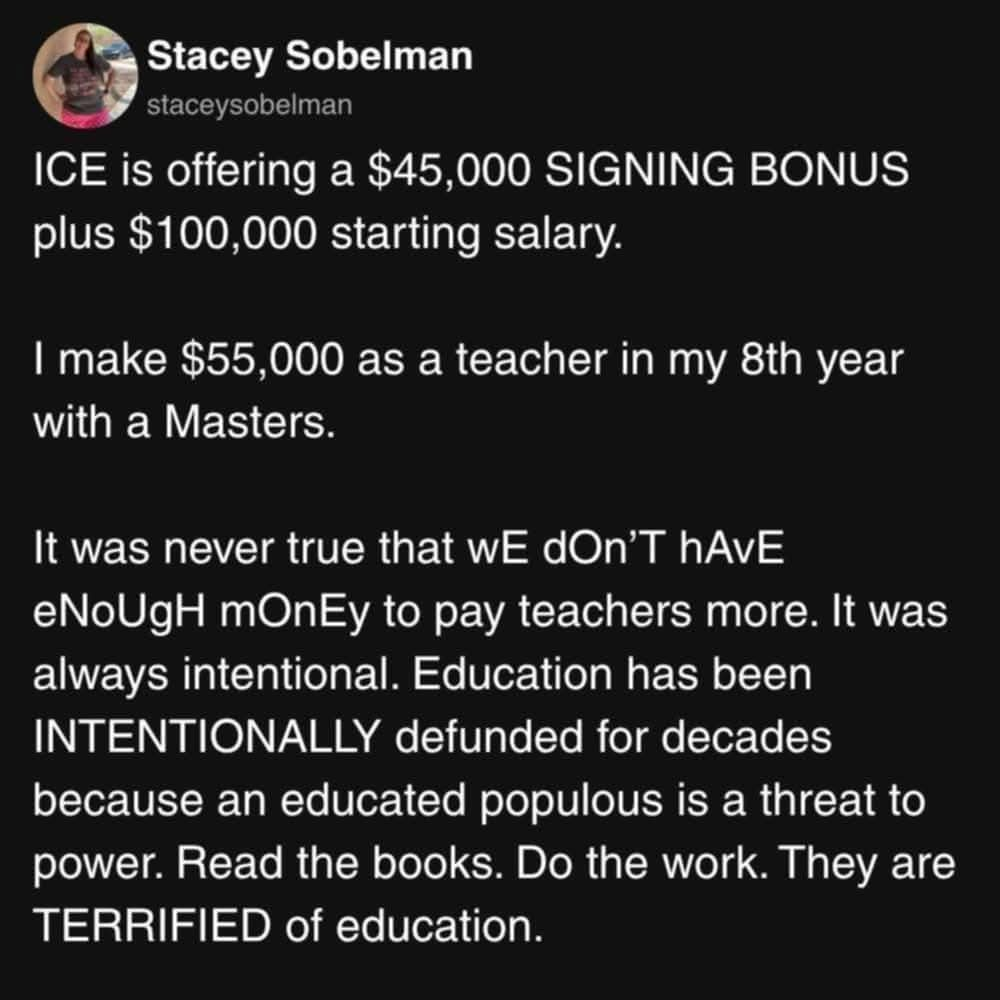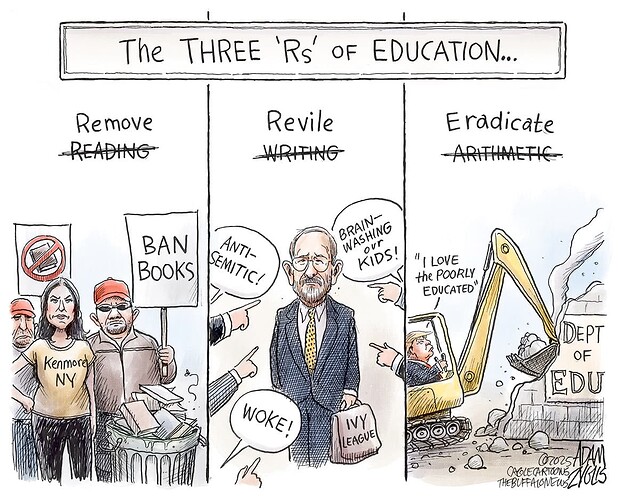man, I just depised phonics. Boring as all get out.
Yeah, but you know what… it worked. It will teach a kid to read, so it has that going for it. I suspect that they can find ways to make it less tedious and more interesting. Couple it with focusing on the attractive parts of reading, the pleasure of a good story or of learning something new.
It was teaching me things I already knew, but in a more tedious manner.
I could see that. I’m not actually sure when I learned to read, or exactly how, and neither are my parents. I would be one of those kids the article above talked about who did just somehow pick it up by being immersed in it. My parents read to me all the time. I also watched Sesame Street and the Electric Company (both of which used phonics, I’m pretty sure), and somehow by age 4, I had learned to read. So when I started first grade in public school, and they were teaching other 6 year olds to read, I was already reading at probably a third or fourth grade level. The school wanted to go ahead and promote me to second grade, but my parents, who were teachers themselves (high school) wouldn’t let them. They did let me sit in with the 2nd grade class during the reading lessons, though. I was still pretty bored.
Maybe my twin brother showed me how. Maybe my parents reading to me helped. What I do remember is that I was reading before I entered elementary school.
The family didn’t have a TV, or (at that stage) a computer. What we did have was a library of books, vinyl records, and a tape recorder where I could listen to my dad read to me.
When I was a tiny kid, my mom read russian novels in translation to me, as she was bored, but it was probably cuter than it was educational
Sure, but not everyone learned to read at the same time or in the same way… my husband was also an early reader, so… ![]() I was just about the same as my peers on where I started reading, but once I started I was pretty voracious, reading above my grade level…
I was just about the same as my peers on where I started reading, but once I started I was pretty voracious, reading above my grade level…
I think the problem with that is that there is an expectation of one-size-fits-all in most public education. But not everyone learns at the same times in their lives or in the same manner… Personally, I like how montesorri tackles this problem by having a multi-age classroom and some level of self-directed learning in the class (guided by the teacher, who does lessons with the class, but then the individualistic hands on approach is taken, where kids do various activities to help them learn the lesson better, which is especially great for smaller kids with concrete ways of thinking and learning). There are still bench marks students need to hit and certain work they need to do over the course of a year, but if they master something early, they do not have to wait for other kids to go on to the next thing. They can do it and then they’re able to demonstrate their mastery by even working with other kids who have not mastered that work.
It’s presented as an expectation, but I’m pretty sure it’s only expected due to funding constraints. “This is what we can afford, let’s make it work”.
I’ve really noticed it, having a couple neurospicy kids and comparing notes with my friends whose kids are a better fit with what’s on offer at public schools. The teachers have mostly been excellent, but their class size is too big to have the flexibility they need to handle both mainstream stuff and the non-mainstream kids’ particular needs. The difference between 20 kids and 25 in a class is enormous; somewhere just over 20 kids most teachers have the wherewithal to manage the class and push the mainstream solution and not much else (not a criticism - I’m not a teacher so my limit is more like two or three kids).
ETA:
This one intrigued me. My son has dyslexia, and once he was reading we noticed he could accurately say the gist of what he’d read, but could not quote with any precision. The exact words were lost within seconds, but the idea remained. So I can see some merit in checking if the student got the right idea.
But to present that as a mainstream strategy feels like travelling in a commercial aircraft with the windows open and the oxygen masks on. This isn’t supposed to be the day-to-day normal.
Maybe that’s part of it, but I think there is a general view among people that there is a “normal” way of being a person, and I think that’s comes from capitalist modernity. Maybe that’s why the expansion of neurodiversity has been met with some alarm by some people? Something must be “wrong” if so many kids are getting diagnosed as being on the spectrum, because it’s means that they’re not “normal”… but maybe there isn’t a “normal” way of being a person.
This is a huge problem with public schools these days. We underfund public education, and then expect it to work for everyone…
I think so too… I think there was some good ideas in the whole language model, but there is a need to understand the basics of words in the written form and how they fit together and how these squiggles make meaning.
I’m approaching this backwards.
-
I can and do read. Phonics was boring as hell for me
-
I have no kids.
-
I’ve read a lot of Steven Krashen, and his ideas mesh well with how I’m learning to read in other languages (French, German, Spanish)
-
Krashen has written a lot on the Reading Wars, but I think he’s one of those “selling the story” rather than being big on phonics.
-
There’s an idea among educational material providers that the other guy is essentially wasting years of a students life and (possibly) permanently damaging the capacity to learn.
There’s also the idea that the emphasis on high stakes tests not only fails to measure how well a person can actually read, but changes how reading is taught-- for the worse.
I mean, I don’t think I disagree with that…
What’s his general argument about how to teach reading?
True, there’s a lot of that out there.
So much this. When I talk to the people saying how there never used to be so many kids with autism or ADHD, I ask them about the kids in their classes when they were in school. They all knew them:
- Those two or three that kept getting in trouble and acting up no matter how often they were sent to the principal’s office? Textbook ADHD, but we didn’t call it that unless their parents could afford an expensive diagnosis process.
- That dreamy one who couldn’t stay on task and doodled all over their desk? Also textbook ADHD, but this time the “distractable” flavour. And back then, no diagnosis would’ve found it.
- The weird kids who had those obsessions with something the rest of the class didn’t care about?
- The ones who never quite figured out how to fit in?
- The quiet ones who fit in well but never went out to parties, just went home and stayed there?
When I point out that, they realize we all knew them. We now have a better idea what they were struggling with, and how to help them, and it’s a lot cheaper than cleaning up after broken adults.
maybe there isn’t a “normal” way of being a person.
That’s such a wonderful way of saying it. Thank you.
Well, he did write this paper:
I guess you should probably thank Foucault, cause he’s the dude who put the idea in my head…

Okay…
Robert Reich covers why there’s an attack on Sesame Street (and education in general, at every level):
CMU shutting down their campus public mural space over someone painting “Rapists not welcome on campus” as Trump was in town is extremely on brand for these universities.
Right wing conception of speech - “we can say what we want and you can say what we want”



